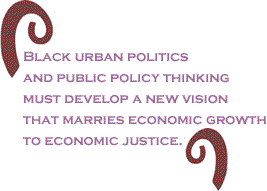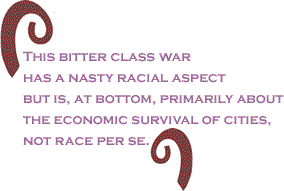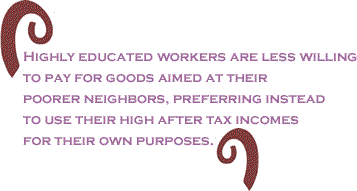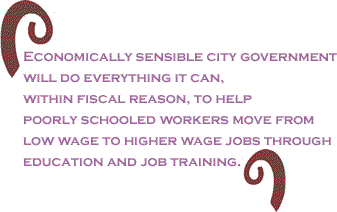
|
|||||||||||||||||||||
 |
Large American cities are in a difficult economic bind, a bind that is especially tough on poor and working class Americans, who are disproportionately black and Latino. The most pressing problem for poor and working class Americans is that American cities are important nodes in a hyper-competitive global economy where highly educated, high income workers consistently beat their poorer counterparts in the marketplace and politics. The high cost of living in big US cities is the free market’s way of telling poor and working class people of all races to leave so as to make room for a vast global pool of talented workers who want to live and work in urban America. Worse, the economic logic of the American city forces any urban government and business community, no matter how progressive, to put the needs of highly educated, well-off populations – no matter their race, color, religion or ethnicity – above those of poor and working class citizens. This bitter class war has a nasty racial aspect but is, at bottom, primarily about the economic survival of cities, not race per se. Does this mean that American cities are destined to become like their European counterparts, where the well-off live within the city limits while working class men, women and children reside in far poorer suburban labor reservations? No, but black urban politics and public policy thinking must develop a new vision that marries economic growth to economic justice in ways that enhance the global competitiveness of cities while creating equal opportunity for all within city limits. This new urban political economy in black will also have to abandon racial populism and simple redistribution if working class urban America is to have a future.
Supply and Demand in the Global City Modern cities are open trading economies that grow and stay rich by serving customers all over the world – selling everything from tourist services like fancy restaurants, museum exhibits, brilliant instruction at leading universities through financial and medical services to high quality, specialized manufactured goods. However, the most important goods and services produced in modern American cities are high quality goods requiring highly skilled, highly educated workers. Modestly educated workers still play a vital role in all processes of production – sales clerks, bus drivers, line cooks, receptionists, plumbers and carpenters are essential in any modern society. But workers with low levels of schooling do not command high wages and bright job prospects compared to their better-schooled counterparts on Wall Street, Madison Avenue and in the upper managers’ suites because of the brutal logic of supply and demand in the global economy. At this moment in history, there is a nearly insatiable demand for the products of highly educated workers compared to a still small supply of these people, while exactly the opposite is true for modestly educated workers. The inequality between high and low income workers in cities affects every aspect of city life, locking modestly educated workers out of opportunities and dividing the city into warring knowledge classes. Landlords and builders, doctors, restaurant owners and shop keepers, among others, grow rich by selling to high-income residents. By contrast, modestly trained workers are increasingly shut out of all of these markets by virtue of their low incomes.
The economic problem faced by modestly trained workers is simple to state and tough to address: workers with low levels of educational attainment do not produce goods and services that command a high price in local or global markets, with the consequence that their incomes are too low for them to get what they need on their own. This problem lurks behind most of the troubles of urban America, from affordable housing to unavailable health care, from crime to bad schools, from chronic unemployment in black and brown communities to bitter battles over taxes, spending and the direction of government. The economy of the modern global city grows when the number of highly educated, high income workers grows, both in absolute terms and relative to the number of poorly educated workers. The business sector of a global city is keen to attract the best and brightest workers in the world with the promise of a vibrant cultural and culinary life, safe streets, good public services, a fine housing stock and low taxes. The business sector also attracts capital to the city by the promise of a large pool of well-schooled labor, excellent public services, a large tax base and a low tax rate. Low-income workers can benefit whenever the inflow of capital and high income labor creates jobs for modestly trained workers or improves the quality of shared public goods. The restaurant boom in major US cities in response to the growing population of high income workers with cosmopolitan tastes is a major source of employment for workers with little formal education, just as improvements in public transit benefit all workers, well and poorly educated alike. But the knowledge-class divide also leads to a class war over the distribution of economic rewards in the city as well as the direction of government. Highly educated workers have a far more limited need for government to provide jobs, income, health care, housing or other essential goods than their less-well off neighbors. Highly educated workers are also less willing to pay for goods aimed at their poorer neighbors, preferring instead to use their high after tax incomes for their own purposes. Bemoaning these high income residents as selfish is beside point: they are acting in their own self-interest as buyers and voters, just like poor people who support parties and candidates promising to use government to redistribute income and opportunity in their direction. The Perverse Logic of Public Goods in the Global City The difference between high income and low income populations in cities amounts to this: if high income populations do not get their needs met, they leave the city, taking the tax base with them. Low income populations demand high levels of city services that can only be paid for by high income populations that do not need them or want them. Worse, the perverse economic logic of global cities makes it hard for high and low income populations to share a city, even when everyone benefits from a large supply of high quality public goods.
For example, if New York City’s deplorable public schools were to suddenly turned into brilliant academies for all of the city’s children, many more people of all colors and classes would want to live there. But highly educated, high income families with children would gradually push low income families out of the city by acquiring an ever greater portion of owner occupied and rental housing, leading to the terrible situation where improvements in public schooling lead to the eviction of poor people from New York. Of course, poor people could stay in New York if better schools were accompanied by more generous housing subsidies or programs that boost the supply of low and moderate income housing. However, this sort of policy would boost the tax rate on high incomes families, perhaps leading to a gradual exodus of the tax base, diminishing the capacity of the city to improve either schools or low income housing. It is important to remember that the problem with American global cities is that the economic logic of growth for cities makes it very hard to redistribute goods and services to poor and working class residents while promoting economic development. Consider another perverse aspect of the economics of bad public schools in a global American city. One of the many reasons that schools in major American cities are so bad is that there is a fundamental conflict between the needs of residents for good schools and the needs of business for good workers. Businesses in major cities can attract good workers by offering competitive wages and good working conditions at least so long as cities are attractive places to work and play. City governments can further enhance growth by offering high quality public services to highly educated workers. This means that cities can grow by attracting workers educated by other governments – whether located in suburban New Jersey or in New Delhi. By contrast, rebuilding a solid system of public education is an expensive proposition that is not likely to bear fruit for many, many years. Why should the business sector and highly educated residents of a major city tax themselves to educate the children of their poorer neighbors when a virtually unlimited supply of highly trained labor is at the city’s doorstep? Economic Justice in the Global City
Is there no way out for poor and working class residents in global cities? Of course there is: poor and working class men and women in global cities can build a durable new social contract between themselves and their high income progressive neighbors – if they pay attention to economic reality and take a moderately long view of economic development. In particular, left-leaning, equality enhancing supply side approaches to public policy can combine economic growth with economic justice by improving the economic competitiveness of local capital and labor in the global economy. Further, progressive urban governments can improve the well-being of poor and working class populations by using smart policy in conjunction with free markets to make it lucrative for the private sector to serve hitherto unprofitable populations. In both cases, progressive government can promote equality and development by creating the right conditions for widely shared growth across the knowledge class spectrum, thereby binding the city’s residents together into a new commonwealth. The new urban agenda requires everyone to understand that economic development must be the common project of all citizens if the city is to become a good place for everyone. In turn, this means that the city government must find ways to enhance incentives for all citizens to improve their capacities to compete in the global economy instead of relying on government to redistribute money from high to low income residents. The primary goal of cities under contemporary conditions is to increase the tax base by bolstering the capacity of residents and businesses to earn the highest possible incomes. That in turn requires cities to increase the skills and asset ownership of the vast majority of residents so that they can earn the highest possible return on their labor or their property, thereby sharing in the economic bounty flowing to competitive cities. The most descriptive label we can assign to this strategy – progressive development – puts the right emphasis on the mix of earnings and wealth growth required for the creation and maintenance of a fair yet competitive city economy. Under progressive development policy, most forms of government taxation and spending policies are aimed at increasing the earning capacity of all workers as well as enhancing asset ownership among low income populations – particularly home ownership and business development. An economically sensible city government will do everything it can, within fiscal reason, to help poorly schooled workers move from low wage to higher wage jobs through education and job training, as well as to increase the extent of home ownership among this rising group of workers. The key point here is that cities can create a broad-based investment climate that increases the capacity of all working adults and business owners to bolster their income earning capacity. The corollary of this strategy is that governments do the wrong thing when they devote substantial resources to subsidize the consumption of populations that either cannot or will not participate in the investment activity of the community. The contemporary economic situation of cities is not unlike those of small, trade dependent countries like Singapore, or when things go very wrong, Haiti. Singapore grew rich because its citizens and business sector pursued an aggressive program of skill development, technological advance and business expansion, thereby allowing the city’s residents to earn higher incomes in an ever-richer city that could afford more and better public services as time went by. US cities can create a climate of growth with widely shared benefits if, but only if, government supports skill creation, skill enhancement, business formation and business expansion activities.
The approach advocated here could also be called the redistributive development state to the degree that government uses its tax and spending powers to tax high income populations in order to promote the skill and earning capacities of lower income and asset poor groups. The flip side of this strategy is that populations with little or nor capacity to develop greater skills or earning power will find themselves receiving less attention and fewer resources, at least in the initial stages of the program. This situation is not due to any inherent disdain for people who are unable to earn a living, or who cannot support themselves at a level consistent with human dignity. Whenever possible, the city government should try to provide a decent minimum level of support for those citizens who are truly unable to make it on their own. However, contemporary economic conditions simply do not permit cities to subsidize activities that do not create assets or yield a return in the near or more distant future. An ethical and progressive city can only provide a real safety net for its weakest citizens when it is rich and growing, and when the vast majority of its citizens are truly well-off enough to take care of their weaker neighbors. However, the weakest among us are obliged to improve ourselves to the greatest extent possible so that we too can offer our labor, intelligence and earnings to the common task of building a good city. So here is the challenge that the economically sophisticated and relevant urban left faces: build a progressive development society that widens the circle of home and business ownership, enhances skill development, creates excellent schools and provides other public goods that can be widely shared across knowledge class lines while enhancing the well-being of the City’s poorest and weakest citizens. This is a tall order, one that will require innovative thinking and political will. It will also require a black urban leadership class willing to see the American city as a premier location in a global system that rewards ability with wealth while punishing weakness and social conflict with poverty. Above all, the new black political class must be willing to write a new social contract across the knowledge divide between highly educated and poorly educated workers, showing everyone that the cities they love will die unless they build a competent commonwealth that is fair to all. Marcellus Andrews is an economist and senior research fellow at the New America Foundation. Dr. Andrews writes on economic policy and economic justice for academic and popular audiences, including The Political Economy of Hope and Fear: Capitalism and the Black Condition in America (1999, NYU Press) and Taking Back Capitalism: A Capitalist Road to Economic Justice (forthcoming, NYU Press). Dr. Andrews received a PhD in economics from Yale University and has taught economics at Wellesley College as well as the City University of New York. Contact him at [email protected] |
| March 3 2005 Issue 128 |
|||||||||
|
|||||||||
|
|
|||||||||
| Printer Friendly Version | |||||||||
 |
|||||||||
 |
|||||||||
| |
|||||||||
| |
|||||||||





























